Listening Comprehension
- 格式:ppt
- 大小:454.00 KB
- 文档页数:41
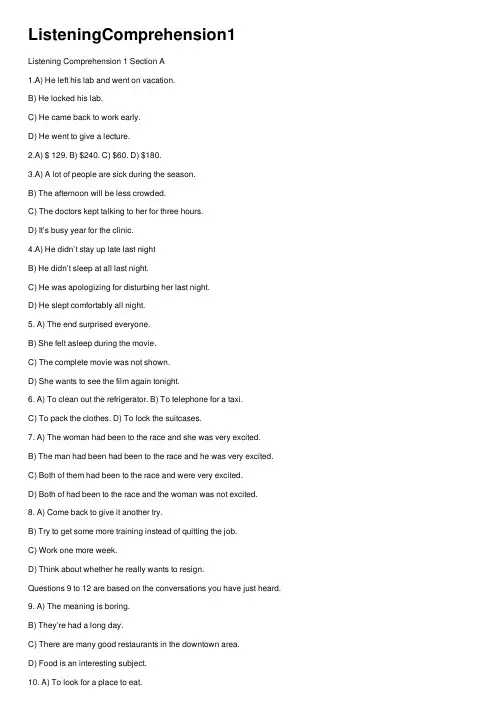

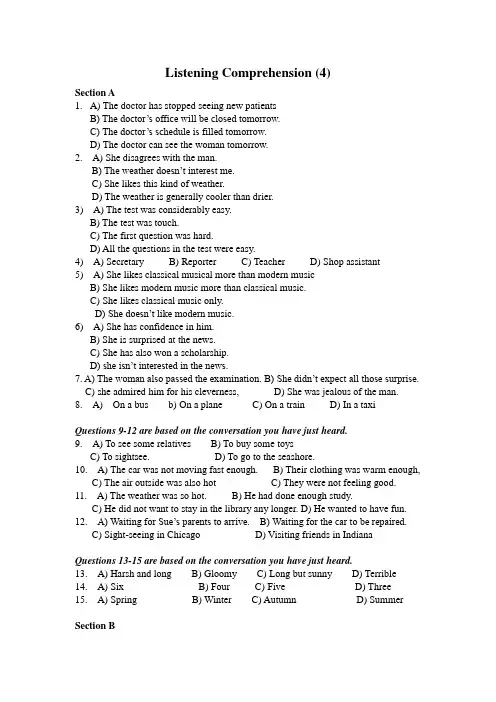
Listening Comprehension (4)Section A1.A) The doctor has stopped seeing new patientsB) The doctor’s office will be closed tomorrow.C) The doctor’s schedule is filled tomorrow.D) The doctor can see the woman tomorrow.2. A) She disagrees with the man.B) The weather doesn’t interest me.C) She likes this kind of weather.D) The weather is generally cooler than drier.3) A) The test was considerably easy.B) The test was touch.C) The first question was hard.D) All the questions in the test were easy.4) A) Secretary B) Reporter C) Teacher D) Shop assistant5) A) She likes classical musical more than modern musicB) She likes modern music more than classical music.C) She likes classical music only.D) She doesn’t like modern m usic.6) A) She has confidence in him.B) She is surprised at the news.C) She has also won a scholarship.D) she isn’t interested in the news.7. A) The woman also passed the examination. B) She didn’t expect all those surprise.C) she admired him for his cleverness, D) She was jealous of the man.8. A) On a bus b) On a plane C) On a train D) In a taxi Questions 9-12 are based on the conversation you have just heard.9. A) To see some relatives B) To buy some toysC) To sightsee. D) To go to the seashore.10. A) The car was not moving fast enough. B) Their clothing was warm enough,C) The air outside was also hot C) They were not feeling good.11. A) The weather was so hot. B) He had done enough study.C) He did not want to stay in the library any longer. D) He wanted to have fun.12. A) Waiting for Sue’s parents to arrive. B) Waiting for the car to be repaired.C) Sight-seeing in Chicago D) Visiting friends in Indiana Questions 13-15 are based on the conversation you have just heard.13. A) Harsh and long B) Gloomy C) Long but sunny D) Terrible14. A) Six B) Four C) Five D) Three15. A) Spring B) Winter C) Autumn D) Summer Section BPassage OneQuestions 16-18 are based on the passage you have just heard.16. A) Facial expression B) GestureC) Movement of the body D) Non-verbal language17. A) Because there is large number of vocabulary.B) Because the non-verbal languages are not easy to understand.C) Because the grammar is too complicatedD) Because there is no language learning environment.18. A) They will think that the child is brave.B) They will think the child is angry.C) They think that the child does not respect the older people.D) They will think that the child is uncomfortable.Passage twoQuestions 19-21 are based on the passage you have just heard.19. A) Supper. B) Lunch C) Breakfast D) Dinner20. A) Cereal B) Coffee or tea C) Sandwich D) Dessert21. A) Tasty B) Nutritious C) Not very good D) NicePassage ThreeQuestions 22-25 are based on the passage you have just heard.22. A) 11:00 a.m. B) 1:00 p.m. C) 3:00 p.m. D) 5:00 a.m.23. A) He thinks the phone call is urgent B) He will be angryC) He will be disappointed D) He will be tired.24. A) To have a talk with him. B) To discuss a problem with him.C) To inform him their decision D) To tell him a problem.25. A) He thought they were mad.B) He didn’t take it seriously.C) He called in the police to talk with the natives.D) He believed there was fight and called the police at once.Section CSome people like watching TV at home, and others may love hiking, But I like being at a bookshop. Time spent in a bookshop can be most ___26____, whether you are a book-lover or merely there to buy a book as a present. You may even have entered the shop to find ___27___ from a sudden shower. Whatever the reasons, you can soon become totally ____28____ of your surroundings.The opportunity to escape the _____29_____ of everyday life is, I think, the main ____30____ of a bookshop. Looking around, one might not be able to see many places where it is ____31___ to do this. You can wander round such a place to your heart’s _____32____ . If it is a good shop, no assistant will ____33____ you with the inevitable greeting: “Can I help you, Sir?” In a ____34___, an assistant should remain in the background until you have finished browsing. Then, and only then, are his service necessary.You have to be careful not to be attracted by the variety of books in a bookshop. It is very easy to enter the shop looking for a book on, say, ancient coins and to come out carrying a book of the latest best selling novel. This sort of thing can be very dangerous. _____35____ running up a huge amount, you can waste a great deal of time wandering from section to section.。
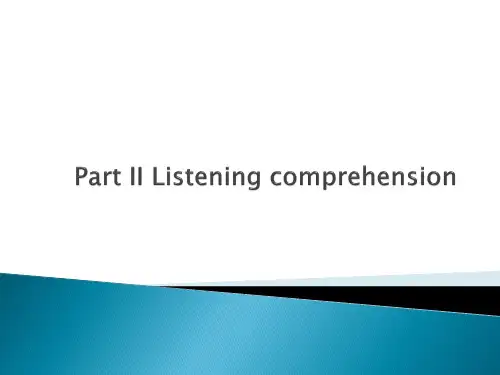
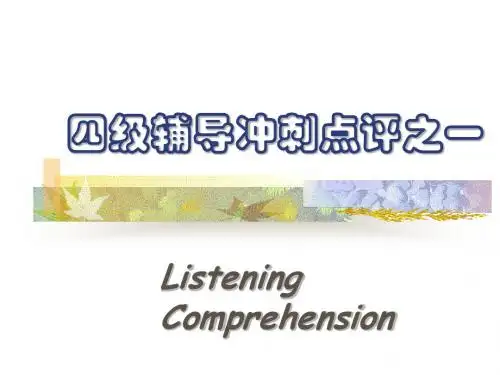
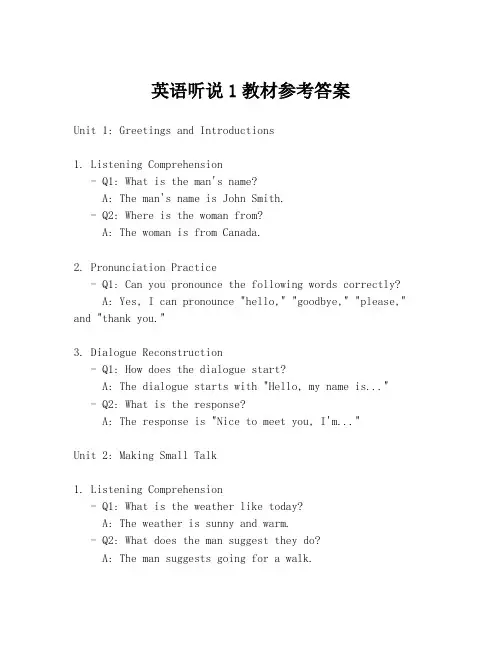
英语听说1教材参考答案Unit 1: Greetings and Introductions1. Listening Comprehension- Q1: What is the man's name?A: The man's name is John Smith.- Q2: Where is the woman from?A: The woman is from Canada.2. Pronunciation Practice- Q1: Can you pronounce the following words correctly? A: Yes, I can pronounce "hello," "goodbye," "please," and "thank you."3. Dialogue Reconstruction- Q1: How does the dialogue start?A: The dialogue starts with "Hello, my name is..."- Q2: What is the response?A: The response is "Nice to meet you, I'm..."Unit 2: Making Small Talk1. Listening Comprehension- Q1: What is the weather like today?A: The weather is sunny and warm.- Q2: What does the man suggest they do?A: The man suggests going for a walk.2. Vocabulary Building- Q1: Fill in the blanks with the correct words.A: The correct words are "weather," "sunny," "warm," "suggestion," and "walk."3. Role Play- Q1: What is the scenario?A: The scenario is two friends meeting at a park.- Q2: What are they discussing?A: They are discussing the weather and making plans for the day.Unit 3: Asking for Directions1. Listening Comprehension- Q1: Where is the man trying to go?A: The man is trying to go to the library.- Q2: What does the woman tell him to do?A: The woman tells him to turn left at the next intersection.2. Vocabulary Building- Q1: Match the following words with their meanings.A: The words are "directions," "intersection," "left," "right," and "library."3. Dialogue Reconstruction- Q1: What is the first question the man asks?A: The first question is "Excuse me, could you tell me how to get to the library?"- Q2: What is the woman's response?A: The woman's response is "Sure, just go straight and turn left at the next intersection."Unit 4: Making Arrangements1. Listening Comprehension- Q1: What time is the meeting scheduled for?A: The meeting is scheduled for 3 PM.- Q2: What does the man need to bring?A: The man needs to bring his laptop and a notebook.2. Vocabulary Building- Q1: Fill in the blanks with the correct words.A: The correct words are "meeting," "scheduled," "laptop," "notebook," and "bring."3. Dialogue Reconstruction- Q1: What is the purpose of the meeting?A: The purpose of the meeting is to discuss the project plan.- Q2: What does the woman remind the man?A: The woman reminds the man to bring his laptop and notebook.Unit 5: Describing Daily Routines1. Listening Comprehension- Q1: What time does the woman usually wake up?A: The woman usually wakes up at 7 AM.- Q2: What does the man do after work?A: The man goes to the gym after work.2. Vocabulary Building- Q1: Complete the sentences with the correct words.A: The correct words are "wake up," "routine," "work," "gym," and "evening."3. Dialogue Reconstruction- Q1: What does the woman do in the morning?A: The woman has breakfast and goes to work in the morning.- Q2: What is the man's evening routine?A: The man's evening routine includes going to the gym and reading.Unit 6: Discussing Hobbies and Interests1. Listening Comprehension- Q1: What is the woman's hobby?A: The woman's hobby is painting.- Q2: What does the man like to do in his free time?A: The man likes to play the guitar in his free time.2. Vocabulary Building- Q1: Match the following words with their meanings.A: The words are "hobby," "painting," "guitar," "free time," and "interest。
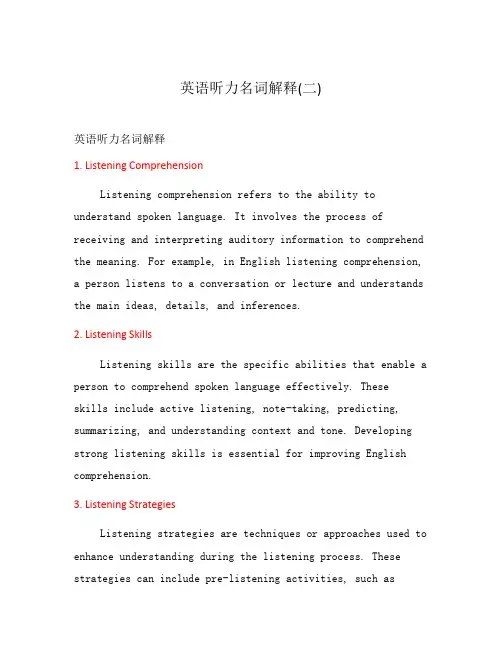
英语听力名词解释(二)英语听力名词解释1. Listening ComprehensionListening comprehension refers to the ability to understand spoken language. It involves the process of receiving and interpreting auditory information to comprehend the meaning. For example, in English listening comprehension, a person listens to a conversation or lecture and understands the main ideas, details, and inferences.2. Listening SkillsListening skills are the specific abilities that enable a person to comprehend spoken language effectively. Theseskills include active listening, note-taking, predicting, summarizing, and understanding context and tone. Developing strong listening skills is essential for improving English comprehension.3. Listening StrategiesListening strategies are techniques or approaches used to enhance understanding during the listening process. These strategies can include pre-listening activities, such aspredicting or brainstorming relevant vocabulary, as well as during-listening activities, such as identifying keywords, taking notes, and paraphrasing information.4. Listening Comprehension ExercisesListening comprehension exercises are activities designed to practice and improve listening skills. These exercises can involve listening to dialogues, interviews, presentations, or audio recordings and answering questions based on the content. They help develop vocabulary, grammar, and overall comprehension abilities.5. Authentic Listening MaterialsAuthentic listening materials refer to real-life audio resources, such as recordings of native speakers, podcasts, songs, or news broadcasts. These materials provide learners with exposure to natural language, accents, and cultural aspects, helping them develop more authentic listening skills.6. Multiple Choice QuestionsMultiple-choice questions are a type of task in which learners must choose one correct option from several provided choices. These questions are commonly used in listening comprehension assessments to evaluate understanding of mainideas, specific information, or logical relationships withina conversation or lecture.7. Listening SpeedListening speed refers to the rate at which spoken language is delivered and heard. It can vary depending on the speaker, context, and language proficiency of the listener. Practicing listening at different speeds can improve comprehension and adaptability in real-life listening situations.8. Context CluesContext clues are hints or information in the surrounding words or sentences that help listeners infer the meaning of unfamiliar words or phrases. Paying attention to contextclues can assist in understanding content and reduce the dependency on dictionary definitions.9. Leveled ListeningLeveled listening refers to graded listening materials that are designed according to learners’ proficiency levels. These materials gradually increase in difficulty, providing learners with appropriate challenges as they progress. Leveled listening helps learners build confidence and understanding at their own pace.10. Listening FatigueListening fatigue occurs when a person becomes mentally or physically exhausted from prolonged or intensive listening activities. It can lead to decreased concentration, comprehension, and overall performance. Taking breaks and practicing active listening techniques can help reduce listening fatigue.Remember, consistent practice and exposure to various listening materials are crucial for improving English listening comprehension skills.。
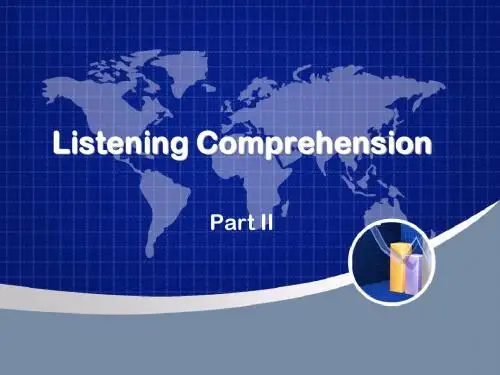
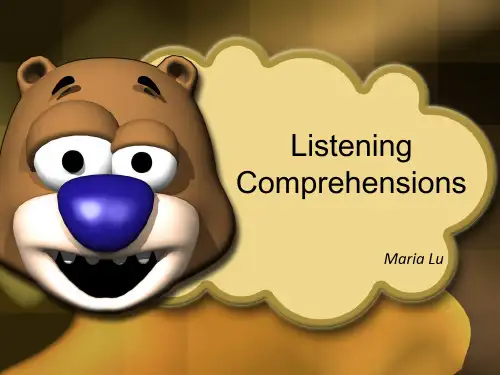
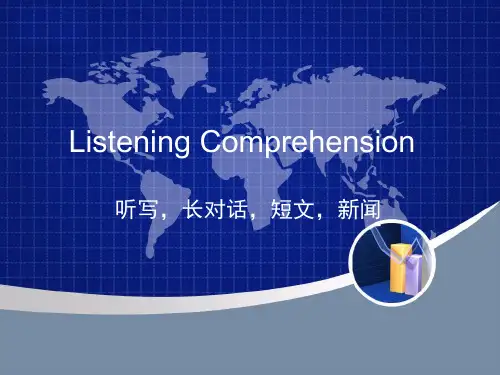
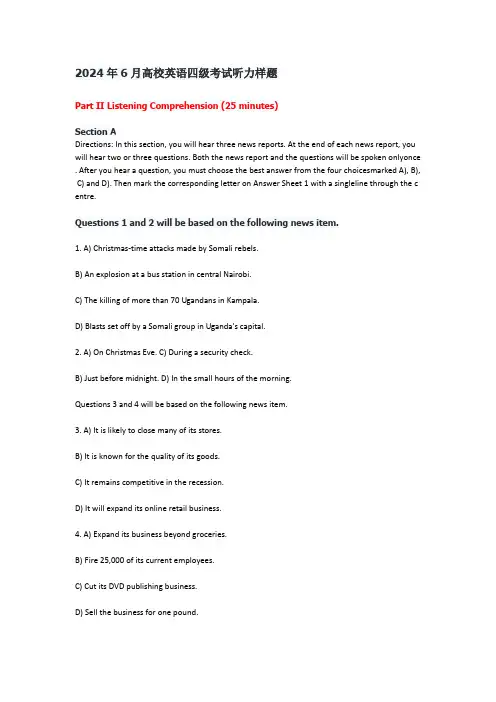
2024年6月高校英语四级考试听力样题Part II Listening Comprehension (25 minutes)Section ADirections: In this section, you will hear three news reports. At the end of each news report, you will hear two or three questions. Both the news report and the questions will be spoken onlyonce . After you hear a question, you must choose the best answer from the four choicesmarked A), B), C) and D). Then mark the corresponding letter on Answer Sheet 1 with a singleline through the c entre.Questions 1 and 2 will be based on the following news item.1. A) Christmas-time attacks made by Somali rebels.B) An explosion at a bus station in central Nairobi.C) The killing of more than 70 Ugandans in Kampala.D) Blasts set off by a Somali group in Uganda's capital.2. A) On Christmas Eve. C) During a security check.B) Just before midnight. D) In the small hours of the morning.Questions 3 and 4 will be based on the following news item.3. A) It is likely to close many of its stores.B) It is known for the quality of its goods.C) It remains competitive in the recession.D) It will expand its online retail business.4. A) Expand its business beyond groceries.B) Fire 25,000 of its current employees.C) Cut its DVD publishing business.D) Sell the business for one pound.Questions 5 to 7 will be based on the following news item.5. A) All taxis began to use meters.B) All taxis got air conditioning.C) Advertisements were allowed on taxis.D) Old taxis were replaced with new cabs.6. A) A low interest loan scheme. C) Taxi passengers' complaints.B) Environmentalists' protests. D) Permission for car advertising.7. A) There are no more irregular practices.B) All new cabs provide air-conditioning.C) New cabs are all equipped with meters.D) New legislation protects consumer rights.Section BDirections: In this section, you will hear two long conversations. At the end of each conversation,y ou will hear four questions. Both the conversation and the questions will be spoken only once.Aft er you hear a question, you must choose the best answer from the four choices marked A),B), C) and D). Then mark the corresponding letter on Answer Sheet 1 with a single line throughthe cent re.Conversation OneQuestions 8 to 11 are based on the conversation you have just heard.8. A) It has a partnership with LCP. C) It specializes in safety from leaks.B) It is headquartered in London. D) It has a chemical processing plant.9. A) He is a chemist. C) He is a safety inspector.B) He is a salesman. D) He is Mr. Grand's friend.10. A) The public relations officer. C) Director of the safety department.B) Mr. Grand's personal assistant. D) Head of the personnel department.11. A) Wait for Mr. Grand to call back.B) Leave a message for Mr. Grand.C) Provide details of their products and services.D) Send a comprehensive description of their work.Conversation TwoQuestions 12 to 15 are based on the conversation you have just heard.12. A) Teacher. C) Editor.B) Journalist. D) Typist.13. A) Some newly discovered scenic spot.B) Big changes in the Amazon valley.C) A new railway under construction.D) The beautiful Amazon rainforests.14. A) In news weeklies. C) In newspapers' Sunday editions.B) In a local evening paper. D) In overseas editions of U.S. magazines.15. A) To become a professional writer. C) To get her life story published soon.B) To be employed by a newspaper. D) To sell her articles to a news service.Section CDirections: In this section, you will hear three passages. At the end of each pa ssage,you will hear some questions. Both the passage and the questions will b e spokenonly once. After you hear a question, you must choose the best answ er from the fourchoices marked A), B), C) and D). Then mark the correspondin g letter on AnswerSheet 1 with a single line through the centre.Passage OneQuestions 16 to 18 are based on the passage you have just heard.16. A) She is both a popular and a highly respected author.B) She is the first writer to focus on the fate of slaves.C) She is the most loved African novelist of all times.D) She is the most influential author since the 1930's.17. A) The Book Critics Circle Award. C) The Pulitzer Prize for fiction.B) The Nobel Prize for literature. D) The National Book Award.18. A) She is a relative of Morrison's. C) She is a skilled storyteller.B) She is a slave from Africa. D) She is a black woman.Passage TwoQuestions 19 to 21 are based on the passage you have just heard.19. A) They are very generous in giving gifts.B) They refuse gifts when doing business.C) They regard gifts as a token of friendship.D) They give gifts only on special occasions.20. A) They enjoy giving gifts to other people.B) They spend a lot of time choosing gifts.C) They have to follow many specific rules.D) They pay attention to the quality of gifts.21. A) Gift-giving plays an important role in human relationships.B) We must be aware of cultural differences in giving gifts.C) We must learn how to give gifts before going abroad.D) Reading extensively can make one a better gift-giver.Passage ThreeQuestions 22 to 25 are based on the passage you have just heard.22. A) She tenderly looked after her sick mother.B) She developed a strong interest in finance.C) She learned to write for financial newspapers.D) She invested in stocks and shares on Wall Street.23. A) She inherited a big fortune from her father.B) She sold her restaurant with a substantial profit.C) She got 7.5 million dollars from her ex-husband.D) She made a wise investment in real estate.24. A) She was dishonest in business dealings.B) She frequently ill-treated her employees.C) She abused animals including her pet dog.D) She was extremely mean with her money.25. A) She carried on her family's tradition.B) She made huge donations to charities.C) She built a hospital with her mother's money.D) She made a big fortune from wise investments.Tape Script of Listening ComprehensionSection ADirections: In this section, you will hear three news reports. At the end of eac h newsreport, you will hear two or three questions. Both the news report andthe questionswill be spoken only once. After you hear a question, you must ch oose the bestanswer from the four choices marked A), B), C) and D). Then mar k the correspondingletter on Answer Sheet 1 with a single line through the ce ntre.Questions 1 and 2 will be based on the following news item.Kenyan police say one person was killed and 26 injured in an explosion at a bus station in central Nairobi. The blast hit a bus about to set off for the Ugandan capital Kampala. Last July, theSomali group al-Shabab said it was behind the blasts in the Ugandan capital which killed morethan 70 pe ople. Will Ross reports from the Kenyan capital.The explosion happened beside a bus which was about to set off for an overnight journey fromNa irobi to the Ugandan capital Kampala. Some eyewitnesses report that a bag was about to beloade d on board, but it exploded during a security check. Windows of the red bus were leftsmashed, a nd blood could be seen on the ground beside the vehicle. Just hours earlier,Uganda's police chief had warned of possible Christmas-time attacks by Somali rebels.1. What is the news report mainly about?2. When did the incident occur?Questions 3 and 4 will be based on the following news item.Woolworths is one of the best known names on the British High Street. It's been in businessnearl y a century. Many of its 800 stores are likely to close following the company's decision tocall in ad ministrators after an attempt to sell the business for a token £1 failed.The company has huge debts. The immediate cause for the collapse has been Britain's slidetowar d recession, which has cut into consumer spending. However, the business had been introuble for years.Known for low-priced general goods, Woolworths has struggled in the face of competition fromsu permarkets expanding beyond groceries and a new generation of internet retailers.Many of the store group's 25,000 employees are likely to lose their jobs. Some profitable areassu ch as the DVD publishing business will survive.3. What do we learn about Woolworths from the news report?4. What did Woolworths attempt to do recently?Questions 5 to 7 will be based on the following news item.Cairo is known for its overcrowded roads, irregular driving practices and shaky old vehicles, butals o for its air pollution. In recent months, though, environmental studies indicate there havebeen si gns of improvement. That's due in part to the removal of many of the capital's old-fashioned blac k and white taxis. Most of these dated back to the 1960s and 70s and were in apoor state of repai r.After new legislation demanded their removal from the roads, a low interest loan scheme was set up with three Egyptian banks so drivers could buy new cars. The government pays about $900for old ones to be discarded and advertising on the new vehicles helps cover repayments.The idea has proved popular with customers ― they can now travel in air-conditioned comfortan d because the new cabs are metered, they don't have to argue over fares. Banks and carmanufact urers are glad for the extra business in tough economic times. As for the taxi drivers,most are deli ghted to be behind the wheel of new cars, although there have been a fewcomplaints about switc hing from black and white to a plain white colour.5. What change took place in Cairo recently?6. What helped bring about the change?7. Why do customers no longer argue with new cab drivers?Section BDirections: In this section, you will hear two long conversations. At the end of eachconversation, you will hear four questions. Both the conversation and the questionswill be spoken only once. After you hear a question, you must choos e the bestanswer from the four choices marked A), B), C) and D). Then mark t he correspondingletter on Answer Sheet 1 with a single line through the centr e.Conversation OneW: Morning, this is TGC.M: Good morning. Walter Barry here, calling from London. Could I speak to Mr. Grand, please?W: Who's calling, please?M: Walter Barry, from London.W: What is it about, please?M: Well, I understand that your company has a chemical processing plant. My own company,LCP,Liquid Control Products, is a leader in safety from leaks in the field of chemical processing. Iwould like to speak to Mr. Grand to discuss ways in which we could help TGC protect itself fromsuch pro blems and save money at the same time.W: Yes, I see. Well, Mr. Grand is not available just now.M: Can you tell me when I could reach him?W: He's very busy for the next few days – then he'll be away in New York. So it's difficult to giveyo u a time.M: Could I speak to someone else, perhaps?W: Who in particular?M: A colleague for example?W: You're speaking to his personal assistant. I can deal with calls for Mr. Grand.M: Yes, well, could I ring him tomorrow?W: No, I'm sorry he won't be free tomorrow. Listen, let me suggest something. You send usdetails of your products and services, together with references from other companies and thenwe'll con tact you.M: Yes, that's very kind of you. I have your address.W: Very good, Mr….M: Barry. Walter Barry from LCP in London.W: Right, Mr. Barry. We look forward to hearing from you.M: Thank you. Goodbye.W: Bye.Questions 8 to 11 are based on the conversation you have just heard.8. What do we learn about the woman's company?9. What do we learn about the man?10. What is the woman's position in her company?11. What does the woman suggest the man do?Conversation TwoM: You're going to wear out the computer's keyboard!W: Oh, hi.M: Do you have any idea what time it is?W: About ten or ten-thirty?M: It's nearly midnight.W: Really? I didn't know it was so late.M: Don't you have an early class to teach tomorrow morning?W: Yes, at seven o'clock. My commuter class, the students who go to work right after theirlesson.M: Then you ought to go to bed. What are you writing, anyway?W: An article I hope I can sell.M: Oh, another of your newspaper pieces? What's this one about?W: Do you remember the trip I took last month?M: The one up to the Amazon?W: Well, that's what I'm writing about—the new highway and the changes it's making in theAmaz on valley.M: It should be interesting.W: It is. I guess that's why I forgot all about the time.M: How many articles have you sold now?W: About a dozen so far.M: What kind of newspapers buy them?W: The papers that carry a lot of foreign news. They usually appear in the big Sunday editionswhe re they need a lot of background stories to help fill up the space between the ads.M: Is there any future in it?W: I hope so. There's a chance I may sell this article to a news service.M: Then your story would be published in several papers, wouldn't it?W: That's the idea. And I might even be able to do other stories on a regular basis.M: That would be great.Questions 12 to 15 are based on the conversation you have just heard.12. What is the woman's occupation?13. What is the woman writing about?14. Where do the woman's articles usually appear?15. What does the woman expect?Section CDirections: In this section, you will hear three passages. At the end of each pa ssage,you will hear some questions. Both the passage and the questions will b e spokenonly once. After you hear a question, you must choose the best answ er from the fourchoices marked A), B), C) and D). Then mark the correspondin g letter on AnswerSheet 1 with a single line through the centre.Passage OneIn today's class, we'll discuss Toni Morrison's novel Beloved. As I'm sure you all know, Morrisonis both a popular and a highly respected author, and it's not easy to be both. Born in 1931,Morrison has written some of the most touching and intelligent works on the African-Americanexperience ever written by anyone, and yet to call her an “African-American writer” doesn'tseem to do her ju stice. In many ways, she's simply an American writer—and certainly one ofour best.Beloved is a truly remarkable work. It was recommended for nearly every major literary prize,incl uding the National Book Award and the National Book Critics Circle Award, and it in fact wonthe P ulitzer Prize for fiction in 1988. Morrison herself is distinguished for having won the NobelPrize fo r literature in 1993.What makes Beloved unique is the skillful, sure way in which Morrison blends intensely personals torytelling and American history, racial themes and gender themes, the experience of Blackswith the experience of all people everywhere, the down-to-earth reality of slavery with a sense ofmyst erious spirituality.We'll be paying special attention to these themes as we discuss this work. I'm particularlyinterest ed in your views on the relative importance of race and gender in this book. Is it moreimportant t hat Sethe, the main character, is black or that she's a woman? Which contributesmore to her bei ng? What does Morrison tell us about both?Questions 16 to 18 are based on the passage you have just heard.16. What do we learn about Toni Morrison?17. What honor did Toni Morrison receive in 1993?18. What does the speaker tell us about Sethe, the main character in Morrison's novel Beloved?Passage TwoThe topic of my talk today is gift-giving. Everybody likes to receive gifts, right? So you may thinkth at gift-giving is a universal custom. But actually, the rules of gift-giving vary quite a lot, and notkn owing them can result in great embarrassment. In North America, the rules are fairly simple.If yo u're invited to someone's home for dinner, bring wine or flowers or a small item from yourcountr y. Among friends, family, and business associates, we generally don't give gifts on otheroccasions except on someone's birthday and Christmas. The Japanese, on the other hand, givegifts quite fre quently, often to thank someone for their kindness. The tradition of gift-giving inJapan is very anc ient. There are many detailed rules for everything from the color of thewrapping paper to the tim e of the gift presentation. And while Europeans don't generallyexchange business gifts, they do fo llow some formal customs when visiting homes, such asbringing flowers. The type and color of flo wers, however, can carry special meaning.Today we have seen some broad differences in gift-giving. I could go on with additionalexamples. But let's not miss the main point here: If we are not aware of and sensitive to culturaldifferences, the possibilities for miscommunication and conflict are enormous. Whether we learnabout these differences by reading a book or by living abroad, our goal must be to respectdifferences among p eople in order to get along successfully with our global neighbors.Questions 19 to 21 are based on the passage you have just heard.19. What does the speaker say about gift-giving of North Americans?20. What do we learn about the Japanese concerning gift-giving?21. What point does the speaker make at the end of the talk?Passage ThreeHetty Green was a very spoilt, only child. She was born in Massachusetts, USA, in 1835. Herfather was a millionaire businessman. Her mother was often ill, and so from the age of two herfather to ok her with him to work and taught her about stocks and shares. At the age of six shestarted read ing the daily financial newspapers and opened her own bank account.Her father died when she was 21 and she inherited $7.5 million. She went to New York andinvest ed on Wall Street. Hetty saved every penny, eating in the cheapest restaurants for 15cents. She b ecame one of the richest and most hated women in the world. At 33 she marriedEdward Green, a multi-millionaire, and had two children, Ned and Sylvia.Hetty's meanness was well known. She always argued about prices in shops. She walked to theloc al grocery store to buy broken biscuits which were much cheaper, and to get a free bone forher m uch loved dog. Once she lost a two-cent stamp and spent the night looking for it. Shenever bough t clothes and always wore the same long, ragged black skirt. Worst of all, when herson Ned fell an d injured his knee, she refused to pay for a doctor and spent hours looking forfree medical help. I n the end Ned lost his leg.When she died in 1916 she left her children $100 million. Her daughter built a hospital with herm oney.Questions 22 to 25 are based on the passage you have just heard.22. What do we learn about Hetty Green as a child?23. How did Hetty Green become rich overnight?24. Why was Hetty Green much hated?25. What do we learn about Hetty's daughter?参考答案Part II Listening ComprehensionSection A1. B2. C3. A4. D5. D6. A7. CSection B8. D 9. B 10. B 11. C 12. A 13. B 14. C 15. DSection C16. A 17. B 18. D 19. D 20. C 21. B 22. B 23. A 24. D 25. C。
Listening Comprehension (CET4)Section ADirections: In this section, you will hear 3 short conversations. At the end of each conversation, one question will be asked about what was said. Both the conversations and the questions will be spoken only once. After each questions there will be a pause. During the pause, you must read the four choices marked A), B),C) and D), and decide which is the best answer. Then mark the corresponding letter on Answer sheet 1 with a single line through the center.注意:此部分试题请在答题卡1上作答。
1.A. The woman is the manager's secretary.B. The man found himself in a wrong place.C. The man is the manager's business associate.D. The woman was putting up a sign on the wall.(Recognise when speaker justifies or supports statements, etc. of other speaker(s).)2.A. He needs more time for the report.B. He needs help to interpret the data.C. He is sorry not to have helped the woman.D. He does not have sufficient data to go on.(Understand expressions of need.)3.A. A friend from New Y ork.B. A message from Tony.C. A postal delivery.D. A change in the weather.(Understand requests for information.)Section BDirections: in this section,you will hear a passage three times. When the passage is read for the first time, you should listen carefully for its general idea. When the passage is read for the second time, you are required to fill in the blanks with the exact words you have just heard. Finally, when the passage is read for the third time, you should check what you have written.注意:此部分试题请在答题卡1上作答。
Listening comprehension (5)第一节听下面5段对话。
每段对话后有一个小题,从题中所给的A、B、C三个选项中选出最佳选项,并标在试卷的相应位置。
听完每段对话后,你都有10秒钟的时间来回答有关小题和阅读下一小题。
每段对话仅读一遍。
1.What happened to the man’s bike?A.He forgot where he put it.B.The woman borrowed it.C.His bike was missing.2.Why can’t they meet on Thursday?A.The woman will have another meeting.B.The woman will have to go out of town.C.The woman will be working on a project.3.Who is the man?A. A judge.B. An interviewer.C. A teacher.4.Why does the woman like the brick house better?A. It is larger.B. It has a larger yard.C. It has a prettier color.5.What’s the probable relationship between the two speakers?A. Doctor and patient.B. Husband and wife.C. Father and daughter.第二节听下面5段对话或独白。
每段对话或独白后有几个小题,从题中所给的A、B、C三个选项中选出最佳选项,并标在试卷的相应位置。
听每段对话或独白前,你都有时间阅读各个小题,每小题5秒钟;听完后,各小题将给出5秒钟的作答时间。
每段对话或独白读两遍。
听第6段材料,回答第6---7题。
Practice test 1Part 1 Listening Comprehension1.A) The edge of the card catalog holds pencils.B) The edges of the card are sharp.C) The pencil can be found on the card catalog.D) There is a pencil sharpener at the end of the card catalog.2.A) The program won‟t go beyond ten.B) There won‟t be more than ten people at the program.C) It will continue beyond the tent.D) The program will end after ten o‟clock.3.A) Bonnie and Paul messed up dinner.B) Both Bonnie and Paul long for dinner.C) Neither Bonnie nor Paul came to dinner.D) Bonnie and Paul used to be thinner.4.A) Mary was looking at the leaf.B) Mary was looking for the leaf.C) Mary looked under the microscope for the leaf.D) Mary wanted to examined the microscope.5.A) Please open the window.B) Do you mind that the window isn‟t open?C) Do you have an open mind?D) I don‟t mind closed windows.6.A) I suspected they didn‟t know the answers.B) They didn‟t think I didn‟t know the answers.C) I was suspected because I knew the answers.D) They didn‟t suspect me because I didn‟t know the answers.7.A) Jane is staring at her elder sister.B) Jane respects her elder sister.C) Jane‟s elder sister told her to look up the word.D) Jane is waiting for her elder sister.8.A) I‟m learning only a little bit of English.B) I bit my tongue while speaking English.C) The best way to learn English is to progress in little bits.D) My English is gradually improving.9.A) How thin are you?B) Have you ever been any heavier?C) Isn‟t Ben thin?D) Is it always made out of thin?10.A) My headache isn‟t getting better.B) It looks like my headache is stopping.C) When I go away I get headaches.D) I‟ve stopped headaches.Section B11.A) He left his notes in class.B) He borrowed the notes from his classmate.C) He needn‟t have the exam.D) A classmate borrowed his notes.12.A) He has a better idea.B) It would be better if Mary could come with him.C) He thinks Mary‟s idea is the best.D) Mary should come up with a better idea.13.A) Finish the work.B) Wait until next morning.C) Go home.D) Have a rest there.14.A) They want to go downtown.B) They want to go to a park.C) The man doesn‟t know where to park the car.D) The man wants to know where the park is.15.A) He wants to join the others.B) He is behind in his work.C) He missed work when he was ill.D) He will catch up with his friends later.16.A) She felt sleepy during the lecture.B) She didn‟t like the lecture.C) She fell asleep also.D) She found the lecture interesting.17.A) The woman has chosen a doctor.B) The man doesn‟t care which color is chosen.C) The man is concerned about the color.D) The man has chosen a different color.18.A) No one has a friend like Tom.B) Everyone is Tom‟s good friend.C)The man feels lucky to have Tom as a friend.D) The woman doesn‟t like any of the man‟s friend.19.A) The man thinks the book is excellent.B) All the papers say that the book is good, too.C) The woman thinks the book is excellent.D) Reactions to the book are different.20.A) Relaxing just a bit.B) Enjoying sight-seeing.C) Getting the room back into shape.D) Exercising.Spot DictationMr. Smith left his car outside his apartment one night, as usual, but when he (1)___________ the next morning to (2)________________, he discovered (3)_______________________. He called the police (4)___________________. When Mr. Smith (5)_______________, the car was back again. He found (6)____________________ on one of the seats and a letter saying that they were sorry to (7)______________________________. Mr. and Mrs. Smith went to the theater(8)_________________________ and enjoyed themselves very much. When they(9)______________, they found almost everything in their apartment (10)______________.Practice Test 2Part 1 Listening ComprehensionSection A1.A) He ran out of film.B) He shouldn‟t have taken so many pictures.C) He had more than enough film.D) He took too many pictures.2.A) She‟s really quite old.B) She‟s quite young actually.C) Surprisingly, she‟s not so young.D) She looks old.3.A) Jim knows nothing about birds.B) Jim‟s chicken cannot fly.C) Jim‟s chicken doesn‟t like fly.D) Jim knows birds a lot.4.A) She should have her ears examined.B) She didn‟t pay attention to her teacher‟s opinion.C) She must listen to her teacher.D) She always does what the teacher tells her.5.A) I used to get up early even though it was hard.B) Getting up early isn‟t too hard.C) I‟ll never get up early.D) It‟s not so easy to get up early every day.6.A) Reading the directions is unnecessary.B) To read the directions only takes a second.C) Reading the directions one time won‟t be satisfactory.D) Don‟t read the directions more than two times.7.A) Anna sees films and plays.B) Anna prefers seeing a movie to playing.C) Anna wants to see a film and then see a play.D) Anna would choose going to a film over a play.8.A) It doesn‟t seem possible that you are American.B) You seem American.C) I didn‟t believe you were American.D) I believe you were born in China.9.A) Fifteen blood tests were taken.B) Forty-five blood tests were all right.C) Half of the blood tests were all right.D) Thirty blood tests were all right.10.A) It takes time to make long-distance calls.B) I‟m a telephone operator.C) Occasionally I call long-distance.D) If I have time, I make long-distance calls.Section B11.A) Eat before the film.B) Eat after the film.C) Grab something to eat during the movieD) Finish her bite of food.12.A) To the hospital.B) To the beach.C) To a department store.D) To a parking area.13.A) He bought a new red car.B) He sold a car.C) He closed for the day.D) He sold Kathy a new red car at full price.14.A) Guard her apartment for her.B) Move to the new hotel downtown.C) Be on the lookout for an apartment for her.D) Show her an apartment in the new hotel.15.A) For the woman to like his friends.B) To have a party.C) To arrange everything.D) To take care of his friends.16.A) She made it herself.B) She had it remade.C) In a supermarket.D) At a hotel.17.A) Finish the book.B) Wait for the due date.C) Find the book.D) Pay the fine.18.A) Missed her friends.B) Made up a story.C) Timed her job.D) Worded over the weekend.19.A) Registration.B) When the line breaks.C) People who don‟t wait their turn.D) How long the line is.20.A) Composers like things other than music.B) Not every composer likes only music.C) Composers like to listen to music a lot.D) Composers usually like records.Spot DictationMr. Blake was a dance teacher. He was (1)__________and always (2)________________. Oneyear he (3)______________________, and was soon teaching a lot of students (4)_______________________, but then he (5)___________________ to a big city. When (6)_________________ who regularly came to his classes heard that he (7)_________________, she told him that the teacher who was to take his place would not be as good as he. Mr. Blake (8)___________ when he heard this. Then the lady said that five teachers (9)_________________ and each new one was (10)_________________________.Practice test 3Part I Listening Comprehension (20 minutes) Section ADirections: In this section, you will hear 10 statements. Each statement will be read only once. Then there will be a pause. During the pause, you must read the four choices marked A), B), C) and D), and decide which one is closest in meaning to the statement you have just heard. Then mark the corresponding letter on the Answer Sheet with a single line through the centre.1. A) He is thinking about seeing his uncle in the future.B) He is eagerly awaiting seeing his uncle.C) He is looking for his uncle.D) He is looking for where to see his uncle.2. A) She repaired her brother's bike.B) He repaired her bike.C) She had her brother repair his own bike.D) He repaired his bike.3. A) I didn't know where you lived, so I didn't visit you.B) I knew your address, so I visited you.C) I didn't know your dress size, so I didn't visit you.D) I went to your address, but I didn't meet you.4. A) Mary made Susan's lunch.B) Mary has to visit Susan at lunchtime.C) Mary is probably visiting Susan during lunch.D) Mary and Susan had lunch together.5. A) He stopped to buy cigarettes.B) He couldn't find any cigarettes to smoke.C) He stopped to smoke a cigarette.D) He no longer smokes cigarettes.6. A) Thirty guests came.B) Thirteen guests arrived.C) Half of the sixty guests were greeted.D) More guests came than were expected.7. A) Take care of me when you come.B) Show your respect to me.C) Come visit me.D) Pay attention to me.8. A) They have thirty children.B) They put their children with thirty others.C) They postponed having a family.D) They lost their children until they were in their thirties.9. A) Two hundred twenty-two passengers called about the flight.B) Flight 222 was announced.C) The flight was delayed.D) Flight 222 was canceled.10. A) Mary and her teacher were running to catch the train.B) Mary missed the train.C) Her teacher hurried to the station. .D) Mary met with her teacher on the train.Section BDirections: In this section, you will hear 10 short conversations. At the end of each conversation, a question will be asked about what was said. The conversation and the question will be spoken only once. After each question there will be a pause. During the pause, you must read the four choices marked A), B) , C) and D), and decide which is the best answer. Then mark the corresponding letter on the Answer Sheet with a single line through the centre.11. A) That the woman lost Susan's number.B) That the man needs to have a phone.C) That the man hasn't yet received Susan's phone number.D) That Susan used to live in California.12. A) At a party.B) At a shop.C) At a restaurant.D) At someone's house.13. A) He is on holiday.B) He never does his homework early.C) He wants to finish his homework before Friday.D) He will finish his homework soon.14. A) He'd make a good government official.B) He should run to his office.C) He should organize the office.D) He should speak to the runners.15.A) His baby cried all night.B) His baby is sick.C) He was next door the whole night.D) He didn't sleep that night.16.A) To be independent.B) To graduate.C) To work for a small company.D) To start a large company.17.A) At his summer school.B) In New York.C) At his brother's address.D) In his hometown.18.A) She wanted to take the 6:00 flight.B) She made a reservation for the 7:00 flight.C) She changed the reservation.D) She misunderstood the man.19.A) Because he wanted to meet the woman's parents.B) Because he didn't know the woman's plans.C) Because he goes to a country house each August.D) Because he won't be able to take a holiday.20. A) Take the subway.B) Take a bus.C) Hurry to the meeting.D) Late for the meeting.Eddie liked music very much when he was at school, but when he ( 1 )___________he decided to study medicine, (2)_________________ . When he passed his examinations and (3) ___________________ , he had to (4) _________________ . There he discovered that a lot of (5) ___________________ and (6) _________________ if pleasant music was played to them. When Eddie (7) _________________ and (8) __________________ , he decided to keep his patients happy by (9) _________________ in his waiting room (10) ______________.Practice Test 4Part I Listening Comprehension (20 minutes) Section ADirections: In this section you will bear 10 statements. Each statement will be read only once. Then there will be a pause. During the pause, you must read the four choices marked A), B), C) and D), and decide which one is closest in meaning to the sentence you have just heard. Then mark the corresponding letter on the Answer Sheet with a single line through the centre.1. A) Jim wants to be a doctor.B) Both Jim's parents are doctors.C) Jim decided not to be a doctor.D) Jim's uncle is a doctor.2. A) Rose's sister lost about two pounds.B) Rose's sister lost ten pounds.C) Rose's sister lost six pounds.D) Rose's sister lost eight pounds.3. A) She failed the test.B) She needed more time to finish the test.C) In spite of her studying she found the test difficult.D) She did well on the test because she studied hard.4. A) He has been painting the bathroom.B) He has been painting a picture.C) He has the bathroom painted.D) He has his hair cut.5. A) They fix refrigerators on holidays.B) They did not fix the refrigerator yesterday because it was a holiday.C) The refrigerator cannot be fixed.D) They fixed the refrigerator yesterday because it was not a holiday.6. A) We will leave at nine o'clock.B) We start work at nine o'clock.C) We will leave at nine-thirty.D) We start work at eight o'clock.B) She bought some flowers.C) She didn't buy anything.D) She bought vegetables and flowers.9. A) Can you help me review the lesson?B) What time does the English class begin?C) Do you have time to fetch the text-book?D) Can I go to the English class right now?10. A) He sold his old computer recently.B) He wants to start his own business.C) He set an example to the young.D) He fixed some computers for the company.Section BDirections: In this section you will hear 10 short conversations. At the end of each conversation, a question will be asked about what was said. The conversation and the question will be spoken only once. After each question there will be a pause. During the pause, you must read the four choices named A}, B), C) and D), and decide which is the best answer. Then mark the corresponding letter on the Answer Sheet with a single line through the centre.11. A) Change her plans.B) Sell her old house.C) Go on vacation.D) Rent a house.12. A) An advertisement.B) A part-time job.C) working hours.D) A phone number.13. A) No, he's too busy.B) The woman hasn't been able to ask him yet.C) Yes, even though he's busy.D) Richard hasn't decided yet.14. A) He is an accountant.B) He works for the manager.C) He answers the phone.D) He is the manager.15 A)left in a hurry.B) He refused to see anyone at the moment.C) He went to the cinema.D) He was standing in front of the door.16. A) He will get the letter.B) The letter shouldn't be in the box.C) He's got something important to do.D) The letter has been taken away already.17. A) The man is not responsible for what happened.B) He should have stopped her.C) He should have been with her.D) He should blame the old lady for her leaving alone.18. A) Some of us hesitated to go on a picnic.B) The bad weather bored most of us.C) Everybody was willing to go on a picnic.D) We decided to go out on a picnic later.19. A) She is certain it is still broken.B) The man should check it.C) It is not very secure.D)It is locked up.20. A) At home.B) At the department store.C) In the supermarket.D) At the barber's.Andrew Nelson, (1) ________________ from Staffordshire, yesterday (2) _________________ in which two people died. He was (3) ___________________ at school when his friend Tony saw the helicopter crash (4) _________________. . Immediately Andrew (5) _________________ to get to (6) ______________. Andrew, whose father is a flying instructor, knew the helicopter was (7) ____________________, but he ran inside and (8) __________________. Meanwhile, (9) ____________________of his school (10)__________________ and the fire brigade.Practice Test 5Part I Listening Comprehension (20 minutes)Section ADirections: In this section, you will hear 10 statements. Each statement will be mad only once. Then there will be a pause. During the pause, you must read the four choices marked A) , B) , C) and D) ,and decide which one is closest in meaning to the sentence you have just heard. Then mark the corresponding letter on the Answer Sheet with a single line through the centre.1. A) This city is like the back of my hand.B) I know this city very well.C) I know this city in the same way that I know the back of my hand.D) I like the back of my hand.2. A) A girl named Snow White lived there.B) There lived a lovely little princess called Snow White.C) There lived a lovely little prince named Snow White.D) The name Snow White was given to a lovely little princess.3. A) The servant complained to the king.B) The king complained of the servant.C) The servant obeyed the king complainingly.D) The servant did what he was asked obediently.4. A) Miss Green went out only at lunch time.B) Lunch time was the only time for Miss Green to go on a diet.C) Miss Green went on fighting even at lunch time.D) Miss Green was on a diet during the lunch time.5. A) It seems reasonable for us to stay where we are.B) We'd better not stay where we are.C) It is a good idea to stay where we are asked to.D) Whether we stay or not makes great difference.6. A) My house is at a distance of four miles from the sea.B) My house is far away from the sea.C) My house walks four miles to the sea.D) My house is only four minutes walk from the sea.7. A) He suffered greatly from a bad cold.B) His neglect of the regulation cost him dearly,C) He was seriously injured because he did not pay any attention to the regulation.D) Regulation made him suffer a lot.8. A) I'm sure that he telephoned last night.B) I doubt that he telephoned last night.C) It's likely that he telephoned last night.D) I know for sure that he didn't telephone last night.9. A) Fishermen used birds to catch Japanese fish.B) Fishermen used Japanese birds to catch fish.C) Fishermen in Japan catch fish with birds as bait.D) Fishermen catch fish in Japan Sea.10. A) The noise drove him to madness.B) He was driven in a mad Car full of noise.C) He drove a mad ear.D) He who was mad drove a car.Section B11. A) Indiana.B) Portersvill.C) Michigan.D) Indianapolis.12. A) Picking her up for her sister.B) Giving her direction.C) Giving her a lift.D) Showing her around the town.13. A) Making a call.B) Waiting at the bus station.C) Knocking at the door.D) Nodding on the bus.14. A) He had to kill someone.B) He never minded killing someone‟s time.C) He had some free time with nothing to do.D) He never minded that his time was lost.15. A) He has known this man before.B) He has trusted strangers before.C) He has never trusted strangers before.D) He has helped this man before.16. A) At the bank.B) In the department store.C) At the stationer's.D) In the classroom.17.A) Six.B) Thirty.C) Two.D) Three.18.A) After the woman,B) Ahead of the woman.C) At the same time as the woman.D) Later than the woman.19. A) He had no idea of chopsticks.B) He couldn't deal with chopsticks.C) He didn't know how to use them but he could manage them.D) He was not sure whether he could handle them or not.19.A) Cook dinner.B) Have dinner.C) Put dinner away.D) Buy dinner at the grocery.Spot Dictation:(1)___________________, there lived a lovely little princess (2)_____________. Her stepmother (3)___________________that someday Snow White would be more (4)___________________. So she dressed (5)_______________________in rags and forced her to work very hard. Snow White obeyed the Queen (6)_______________.Each day the Queen asked her magic mirror, “Magic mirror on the wall, who is(7)____________?”“You are, the mirror would reply. Then the Queen would (8)______________. However, Snow White did not know that. She (9)____________________a handsome prince who might find her and (10)_____________________.Practice Test 6Part I Listening ComprehensionSection A1. A) I don't like playing games on computer.B) I'd rather play games than work on computer.C) Playing games on computer is what I like to do most.D) There is nothing that I don't like to do.2. A) I remember that I have seen him in a certain place.B) I will remember to see him in somewhere.C) To remember seeing him somewhere before is what I should do.D) The fact is I saw him somewhere before, but I can't remember it.3. A) We can do nothing to stop the process of aging.B) There is nothing that we can't do to stop the process of aging.C) To stop the process of aging is something we can do.D) There is something we can do to stop the process of aging.4. A) They shouldn't have been so fussy about it.B) They should have made so much fuss about it.C) It was unnecessary for them to make a fuss about it.D) They need have made a fuss about it.5. A) He is not only creative but also talkative.B) He is creative but speaks little.C) He speaks a lot but is poor in ideas.D) He is lacking in ideas though is very creative.6. A) I was supposed to hand in my research paper on Tuesday, but I forgot it.B) I forgot to finish my research paper on Tuesday.C) I forgot finishing my research paper on Tuesday.D) My research paper was expected to be handed in on Tuesday and I remember it.7. A) Peter would like to go to the university.B) Peter might as well get a job.C) It is better for Peter to get a job.D) Peter determined to get a job instead of going to the university.8. A) Smoking threatens your health,B) If you smoke too much, it will be harmful to your health.C) Smoking is very dangerous to your health.D) You will put your health in danger as long as you smoke.9. A) The snow is falling on the leaves and the house looks like a new one.B) Snow's family plans to move into their new house.C) The Snows are going to sell their old house and buy a new one.D) Mr. Snow is going to leave his old house and move to a new one.10. A) He was sure of the decision he had made.B) He was not certain whether he had made the right decision or not.C) Whether he had made the right decision or not was quite certain,D) It was certain that he had made the right decision.Section B11. A) She had difficulty in solving the maths problem, yet she managed it.B) The maths problem was too difficult for her to understand.C) The maths problem was not difficult and she solved it with ease.D) She understood the maths problems but she could not solve it.12. A) She is easy-going.B) She is an ill-natured person.C) She looks mean, but deep down she is kind.D) She is strict with her students.13. A) He just reminded her of her birthday.B) He brought her a beautiful rose for her birthday.C) He was going to buy a beautiful rose for her birthday.D)' He was going to take her out to buy a beautiful rose she liked.14. A) Hobbies.B) How to kill time.C) Their favorite hobby.D) Music class.15. A) He has got a bike.B) He is good at maths.C) He is poor in maths.D) He goes to school by bike.16. A) A teacher.B) A millionaire.C) An officer in travel agency.D) An English teacher.17. A) The man himself.B) The man's mother.C) The cleaner.D) The woman.18. A) He missed the train.B) He missed the train because he overslept.C) Though he got up early, he missed the train.D) He didn't miss the train because he got up early.19. A) Store.B) The man himself.C) The woman.D) His tailor.20. A) $ 358.58.B) $158.00.C)$ 200.58.D)$100.58.Spot Dictation:Here are two cars that may some day (1)________________today‟s big automobiles. If everyone (2)__________________in the future, there will be (3)___________________in cities, and thestreets will be (4) __________________. Three such cars can (5)_____________________now needed for one car of the usual size.The little cars will (6)_______________to own and to drive. Driving will be safer, too,(7)_____________can go only 65 kilometers (8)_____________.The cars of the future will be fine for (9)________________, but they will not be useful(10)____________________.Practice Test 7Part I Listening Comprehension (20 minutes)Section ADirections: In this section you will hear 10 statements. Each statement will be read only once. Then there will be a pause. During the pause, you must read the four suggested choices marked A), B), C) and D), and decide which is closest in meaning to the sentence you have just heard. Then mark the corresponding letter on the Answer Sheet with a single line through the center.1. A) Mr. Smith is not pleased to be employed.B) Mr. Smith is pleased to be employed..C) Mr. Smith is presently employed.D) Mr. Smith is out of work now.2. A) I guess everything goes against us.B) I guess everybody is working for us.C) I guess everything is welcome.D) I guess everything is going to be fine.3. A) You should remember these things if you are interested in this job.B) You should remember these things when you are having a job-interview.C) You don‟t have to remember these things if you decide to look for a new job.D) You can refer to these things when you are job-hunting.4. A) I graduated from the University of California.B) I enrolled in a mechanical engineering university in California.C) I finished my university course in the University of California.D) I studied in a mechanical engineering university in California.5. A) He is trying to hide the fact that he is old.B) Nothing could prevent him from growing old.C) The fact that he is growing old could not be hidden.D) Nobody could hide the fact that he is old.6. A) He insists that introducing the new method has no advantage.B) He believes that it is advantageous to the introduction of the new method.C) He insists on introducing the new method because it is advantageous.D) He disagrees with the view that there is no advantage in introducing the new method.7. A) I was as clever as he was.B) I was much cleverer than he was.C) I was not as clever as he was.D) He was much cleverer than I was.8. A) He has got an idea at the last minute.B) He always makes up his mind at the last minute.C) He never changes his mind until the last minute.D) He always loses his mind at the last minute.9. A) The train entered the railway station with the dense fog.B) The dense fog stopped the train.C) The train was delayed by the dancing group.D) The train was not punctual because of the dense fog.10. A) Both Miss Green and Miss Grey are in grey today.B) Miss Grey is in grey and miss Green in green today.C) Gre y is Miss Green‟s favorite color while green is Miss Grey‟s.D) Miss Green is dressed in grey and miss Grey in green today.Section BDirections: In this section you will hear 10 short conversations. At the end of each conversation, a question will be asked about what was said. The conversation and the question will be spoken only once. After each question there will be a pause. During the pause, you must read the four choices marked A), B), C) and D), and decide which is the best answer. Then mark the corresponding letter on the Answer Sheet with a single line through the center:11. A) The picture is what he wants to get.B) He understands the situation.C) He is going to buy a picture for the party.D) He intends to join in the party.12. A) At the restaurant.B) At the man‟s clothes store.C) In the cinema.D) In a supermarket.13. A) Studying engineering.B) Skydiving.C) Working as a mechanic.D) Doing a lot of fascination things.14. A) Looking for newspapers.B) Seeking information from the classified.C) Asking a person called Clara for help.D) Going to the advertising company.15. A) Interviewer and interviewee.B) Manager and clerk.C) Shop-girl and consumer.D) Landlady and tenant.16. A) She‟d like to have a look at it right away.B) She has to work though she likes to go and see it.C) She has to stay in the middle of the right place now.D) She is unwilling to go and see it.17. A) She was injured while working.B) She just lost her job.C) She was not feeling well.D) She found a job now.18. A) There was a traffic accident.B) There was a driving test.C) There was a person killed in an accident.D) The lady hit a man.。
Part I Listening ComprehensionSection ADirections: In this section, you will hear 8 short conversations and 2 long conversations. At the end of each conversation, one or more questions will be asked about what was said.Both the conversation and the questions will be spoken only once. After each questionthere will be a pause. During the pause, you must read the four choices marked A), B),C) and D), and decide which is the best answer, then mark the corresponding letter onAnswer Sheet with a single line though the centre.1. A) The man hates to lend his tools to other people.B) The man hasn’t finished working on the bookshelf.C) The tools have already been returned to the woman.D) The tools the man borrowed from the woman are missing.2. A) Save time by using a computer.B) Buy her own computer.C) Borrow Martha’s computer.D) Stay home and complete her paper.3. A) He has been to Seattle many times.B) He has chaired a lot of conferences.C) He holds a high position in his company.D) He has lived in Seattle for many years.4. A) Teacher and student. B) Doctor and patientC) Manager and office worker. D) Travel agent and customer.5. A) She knows the guy who will give the lecture.B) She thinks the lecture might be informative.C) She wants to add something to her lecture.D) She’ll finish her report this weekend.6. A) At art museum. B) A beautiful park.C ) A college campus. D)An architectural exhibition.7. A) The houses for sale are of poor quality.B) The houses are too expensive for the couple to buy.C) The housing developers provide free trips for potential buyers.D) The man is unwilling to take a look at the houses for sale.8. A) Talking about sports. B) Writing up local news.C) Reading newspapers. D) Putting up advertisements.Questions 9 to 11 are based on the conversation you have just heard.9. A) To do some window shopping.B) To kill time at the store.C) To buy a birthday gift for her daughter.D) To weigh on whether to buy a gold watch.10. A) A calculator. B) A bracelet.C) A watch. D) A ring.11. A) Because they were expensive.B) Because she considered them too cheap.C) Because she wanted something more attractive.D) Because her daughter wouldn't like them.Questions 12 to 15 are based on the conversation you have just heard.12. A) In the home. B) Outside the home.C) In the factory. D) In the office.13. A) Because men should be responsible for the whole housework.B) Because women can also make contributions to the society.C) Because women can only belong to the society.D) Because men should take care of family life.14. A) As a young woman she hopes to change the old ways women work.B) As an old woman she doesn’t think people should change the ways women work.C) Young women should consider more about their future life.D) Young women need to get rid of the tradition to live a better life.15. A) Women’s future life.B) Women’s importance at homeC) Women’s role in the society.D) Women’s liberation movement.Section BDirections: In this section, you will hear2 short passages. At the end of each passage, you will hear some questions. Both the passage and the questions will be spoken only once.After you hear a question, you must choose the best answer from the four choicesmarked A), B), C) and D). Then mark the corresponding letter on the Answer Sheet 2with a single line through the centre.Passage OneQuestions 16 to 18 are based on the passage have just heard.16. A) Man can understand things quickly. B ) Man has learned to use language.C ) Man can learn. D) Man has brains.17. A) An ape can make noises. B) An ape can understand things.C) An ape can learn words. D) An ape can make sentences.18. A) How children learn to speak.B) Why apes can learn a few words.C) Man’s brain helps him to learn to speak.D) What happens when man speaks.Passage TwoQuestion 19 to 20 are based on the passage have just heard.19. A) Nicotine. B) Ashes. C) Smoke. D) Tar.20. A) To keep selling people cigarettes with less tar.B) To persuade people to give up smoking entirely.C) To reduce the risk to people’ health.D) To let people know the risk to people’s health.。